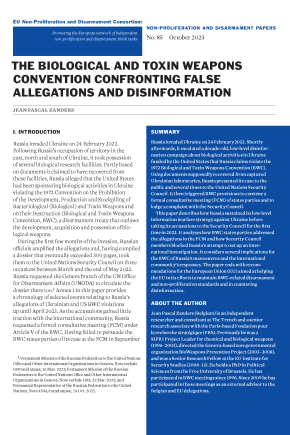The Biological and Toxin Weapons Convention Confronting False Allegations and Disinformation
Russia invaded Ukraine on 24 February 2022. Shortly afterwards, it escalated a decade-old, low-level disinformation
campaign about biological activities in Ukraine funded by the United States that Russia claims violate the 1972 Biological and Toxin Weapons Convention (BWC). Using documents supposedly recovered from captured Ukrainian laboratories, Russia presented its case to the public and several times to the United Nations Security Council. It then triggered BWC provisions to convene a formal consultative meeting (FCM) of states parties and to lodge a complaint with the Security Council.
This paper describes how Russia sustained its low-level information warfare strategy against Ukraine before taking its accusations to the Security Council for the first time in 2022. It analyses how BWC states parties addressed the allegations in the FCM and how Security Council members blocked Russia’s attempt to set up an international investigation. It considers several implications for the BWC of Russia’s manoeuvres and the international community’s responses. The paper ends with recommendations for the European Union (EU) aimed at helping the EU in its efforts to maintain BWC-related disarmament and non-proliferation standards and in countering disinformation.
I. Introduction
II. Biological warfare in the new ecosystem of information manipulation
III. Invoking Article V of the Biological and Toxin Weapons Convention
IV. Procedures under Article VI of the Biological and Toxin Weapons Convention
V. Final reflections and recommendations

